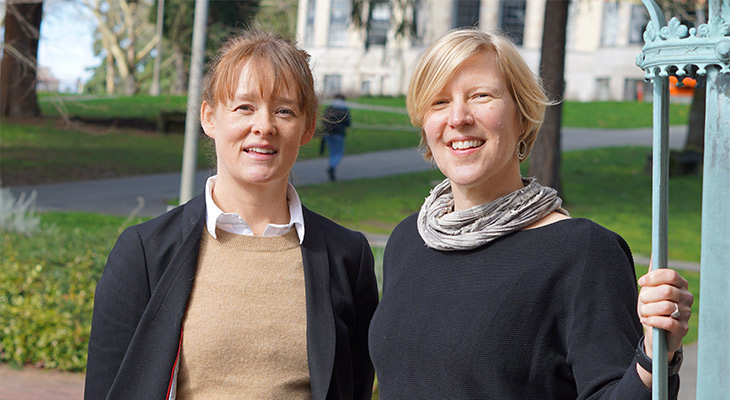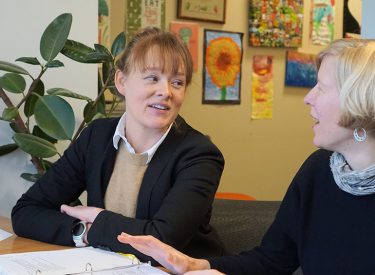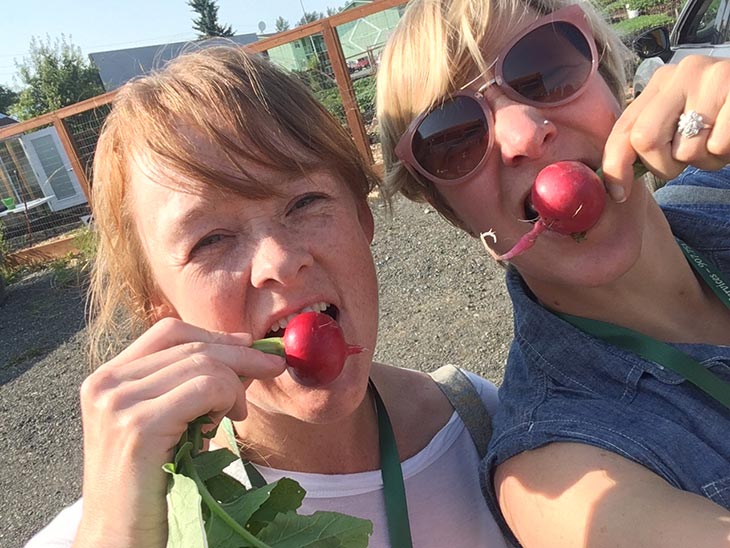RDN training with a public health lens
By Lori Tiede

Colorful canvas art, posters, paintings of food, and a few selected children’s drawings line the hall as you enter the University of Washington RDN training program office. This bright and vibrant space is home to the Graduate Coordinated Program in Dietetics, also known as the GCPD by staff, faculty and students in the program.
Anne Lund, program director, and Michelle Averill, the program’s clinical coordinator both bring a deep love for nutrition science to their roles, and want the students they mentor to understand how to make change at both the individual and community levels. The community level includes institutional, state and federal policies and programs.
“What we’re going for in public health is to make the easiest default choice—for all those little choices an individual makes in a day—be the one that’s healthier,” says Lund. “I want all my students to graduate understanding how much influence those upper level programs and policies have in changing environments and individual choices.“
The UW program is one of a handful of ACEND accredited coordinated programs in the nation that are also offered at a graduate-level.
The program is positioned within the School of Public Health so whether a student chooses to pursue an MS or MPH degree, all students benefit from understanding the issues from the public health perspective.

Averill says, “Even though MS students in our program are not planning to go out and do the big policy work as an MPH student may, they are educated in systems-level thinking, and they understand the complexities of our system and our environment. This makes them stronger practitioners as a result.”
Lund adds that the program has a leadership focus and works with students to meet them where they are at, while challenging them to achieve their individual career goals.
Finding their way to a career in nutrition
Lund and Averill both developed an interest in nutrition as undergraduates, but took different paths before arriving at graduate school.
Averill majored in biology at the University of Washington, then chose to enter the UW’s doctoral program in nutritional sciences. Being grounded in evidence-based practice at the UW has stayed with her and is an area of strength she brings to her role as clinical coordinator to the RDN program today.
Lund took her first nutrition class as a freshman at University of Wisconsin-Madison and found she loved it. She completed a degree in nutrition and a coordinated dietetic program, then worked as a dietitian for a few years abroad before applying to the University of Washington for graduate school.
Lund and Averill arrived at the UW Nutritional Sciences graduate program a year apart.
“We didn’t know each other immediately. We were different cohort years and each doing our own thing,” says Averill.
Post-graduate work for Lund included research at the Center for Public Health Nutrition where her focus was on screen-time reduction in early childhood education and wellness policies in k-12 schools.
“Spending 5 years looking at how school wellness policies changed childrens’ health behaviors made me a strong believer in policies that require environmental change,” says Lund.
“We found that children who attended schools with wellness policies that limited the sale of sugar sweetened beverages (SSBs) were consuming fewer SSBs both at school and overall.
Many students come to our program wanting to pursue careers in nutrition education. I try to push them to expand their career goals to include developing programs and policies that make it easy for community members to make the healthy choice. This framework is based on the social ecological model and works to address social determinants of health.”
Averill worked with Dr. Bornfeldt and Dr. Chait as a postdoc at the UW Medicine Diabetes Institute where her focus was on lipid metabolism, diabetes, and cardiovascular disease.
“Through my graduate and postdoc work I gained deep appreciation for the pathophysiology of disease and how it related to nutrition. This has provided a valuable foundation to understand evidence nutrition and be able to articulate the interconnections of diet and health,” Averill says.
Clinical connections
Lund and Averill are well-connected within the School of Public Health, School of Medicine, hospitals, and public health agencies and have cultivated strong relationships in the region resulting in the program’s affiliation with an expansive network of curricular and internship opportunities for students.
Both faculty have been involved in Interprofessional Education sessions with the Schools of Medicine, Nursing, Dentistry, Pharmacy and Social Work. Dietetic students participate in a series of sessions over their second year where they learn to work through cases and topics as an interdisciplinary team.
Each autumn, Averill meets with Lund to identify placements that support the students broader goals as well as allowing students to explore new interests that surfaced while taking courses.
“I really enjoy teaching acute care nutrition to our students, and am proud at how successful our students are in delivering care at our affiliated hospitals,” says Averill. “I also love coming to work every day because working with Anne and Lacey is a delightful experience.”

Today, Lund and Averill are not only colleagues but also great friends outside the office. They often plan outings together with their children or go for a long walk through the backstairs of Queen Anne to work through a curricular issue.
Lacey Henderson, the GCPD student services coordinator is also an instrumental third member of their team.
“Lacey keeps us organized and is often the link that keeps us in sync,” says Lund.
Combating inequities in dietetic practice
Always aspiring to make the system better from within, another recent initiative Lund undertook was to develop a competency for dietetic education on understanding how racism can undermine health. The School of Public Health has a similar competency.
Lund believes as a profession, dietetics hasn’t done enough work in this area. Both Lund and Averill started adding content to the GCPD curriculum to fill this gap. They were thrilled to find that the students were way ahead of them in thinking about these topics and wanting to bring it into the formal academic setting.
This year’s cohort of students welcomed Rebecca Finkel, a local RDN into the classroom to discuss developing cultural humility and decided to read the book, White Fragility by Robin DeAngelo together.
Last summer, Lund enlisted two graduate students, Divya Pahwa and Evelina Miropolsky, to gather resources on how to teach about racism within dietetics, so the materials could be shared on the Diversify Dietetics web page soon.
Lund has also submitted competencies on understanding racism in nutrition to the Accreditation Council for Education in Nutrition and Dietetics to be considered as part of required dietetic curriculum.
Lund and Averill are both very proud of the RDN program and feel their experiences as graduate students and researchers in the Nutritional Sciences Program has helped shape their philosophy and values, and has given them a unique insight into the student perspective.
Are you interested in graduate-level RDN training at UW? Learn more about the Graduate Coordinated Program in Dietetics (GCPD).
March 11, 2020